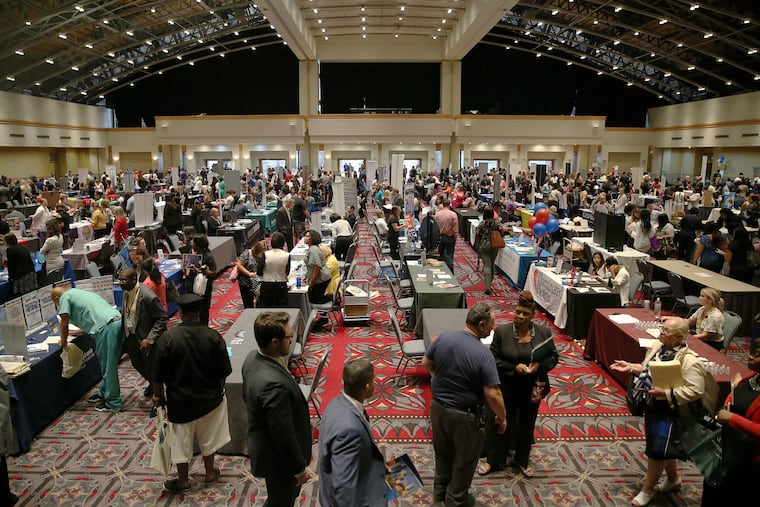Suburbanites benefited from Philly’s post-recession job growth more than city residents, report says
An analysis of census data showed that the majority of the city's job growth was in low-wage jobs largely taken by city residents. But commuters saw gains in higher-paying positions.

Although Philadelphia has added tens of thousands of jobs since 2009, its residents have largely experienced those gains through low-wage work, according to a new Pew report analyzing census data. That’s compared to those who work in Philly but live in the suburbs — they’ve seen job growth across the board.
The findings, which researcher Seth Budick said are consistent with national and regional trends, are another window into the income inequality and employment issues facing the poorest big city in the nation.
Some takeaways from the report:
Philly’s job gains, from 2009 to 2017, were largely centered on the lower-paying end of the spectrum, and to a lesser extent on the higher end. For city residents, the number of jobs paying somewhere in the middle — $35,000 to $49,000 a year — dropped.
Nearly all of the 10 fastest-growing jobs held by city residents paid less than $40,000. The fastest-growing jobs — personal care aides and nursing, psychiatric, and home health aides — were among the lowest paid. Meanwhile, the fastest-growing jobs for commuters, such as managers and “management specialists," were more likely to pay above the median wage.
Other cities have seen a wage gap between residents and commuters, but Philly has the highest disparity after New York. Philly residents earn 55% of what commuters make, while New York residents make 51% of what their commuter counterparts earn.
What can be done?
Labor advocates have turned to politicians to raise standards for low-wage workers. It’s a strategy seen in big cities across the country, though employers have pushed back, saying that these measures make it harder for them to operate and could lead to job loss. Philly is not allowed to raise its minimum wage because a state law that prohibits it, but organizers have fought and won such laws as “Fair Workweek,” which mandates consistent scheduling for service workers, and a “just cause” bill against unfair firings for parking lot workers. United Home Care Workers of Pennsylvania has been organizing home-care workers to help raise standards.
There are also workforce development programs that help people climb the ladder from low-wage to higher-wage, like the 1199c Training and Upgrading Fund program to help workers become licensed practical nurses. The two-year program by the health workers union serves about 60 people each year.
But there are barriers to entry, said Cheryl Feldman, executive director of the Training and Upgrading Fund: the burden of poverty. “People who are in low-wage jobs, they can’t just stop working,” she said. “They have to work, go to school, and take care of their families.” It would help, she said, if there were tax credits or other kinds of incentives for employers to invest in running apprenticeship programs.
The Philadelphia Inquirer is one of 21 news organizations producing “Broke in Philly,” a collaborative reporting project on solutions to poverty and the city’s push toward economic justice. See all of our reporting at brokeinphilly.org.